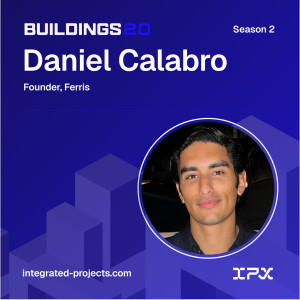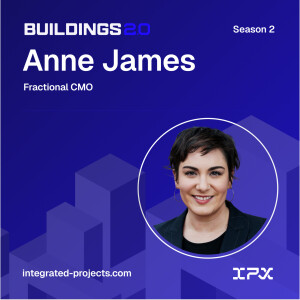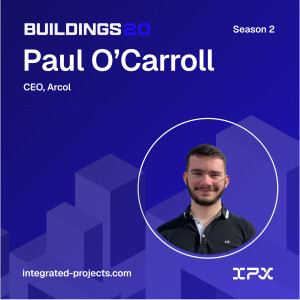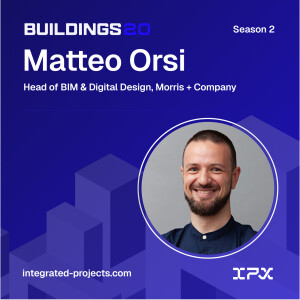Buildings 2.0
Buildings 2.0 dives deep into the technology, trends and talent reshaping the structures where we live and work. Hosted by Jose Cruz Jr, this podcast brings you interviews with the industry’s brightest minds, from visionary architects and property owners to chief innovation officers. Brought to you by Integrated-Projects.com.
Episodes

Friday Nov 07, 2025
Friday Nov 07, 2025
In this episode, Matt Cooper, CEO of BQE, discusses his journey into the architecture and engineering (A&E) sector, the challenges faced by firms in this industry, and the importance of customer obsession. He highlights the struggles of subscale firms, the barriers to adopting new software, and the role of AI in enhancing operations. Matt also shares insights on leadership, the balance between software and service, and the lessons learned from parenting that apply to business management.
Takeaways
Customer obsession is a core value at BQE.
A&E firms face unique challenges in managing client relationships.
Subscale firms often struggle with high client concentration.
Many firms still rely on outdated software solutions.
Effective project management is crucial for A&E firms.
Adoption of new software can be hindered by fear of change.
AI can enhance efficiency but won't replace jobs.
Balancing software development with customer service is essential.
Understanding the growth stages of firms helps tailor solutions.
Parenting experiences can inform better leadership practices.

Wednesday Oct 22, 2025
Wednesday Oct 22, 2025
In this episode, Jose Cruz interviews German Aparicio Jr., a program manager at Trimble, discussing his journey from architecture to technology and the evolving landscape of the AEC industry. They explore the challenges and opportunities for startups in the architecture and construction sectors, the role of corporate venture capital, and the importance of innovation in building lifecycle management. German shares insights from his experience with the Zero to 60 accelerator program, emphasizing the need for curiosity and collaboration in driving industry advancements.
Takeaways
German's childhood curiosity about how things work led him to architecture.
The transition from academia to software can be rewarding for architects.
Risk aversion in AEC is changing, with firms becoming more open to innovation.
Startups in AEC face unique challenges, including the need for warm introductions.
AI is becoming increasingly important in the architecture and construction industries.
The Zero to 60 program at Trimble supports startups in scaling their solutions.
Corporate venture capital can provide strategic partnerships for startups.
Finding product-market fit is essential for early-stage companies.
Startups should focus on educating large organizations about their solutions.
Curiosity is a key driver for success in architecture and technology.

Monday Oct 20, 2025
Monday Oct 20, 2025
In this episode, Jose Cruz interviews Francis Cooke, a Design Principal at AECOM, discussing his journey into architecture, the importance of carbon reduction, and the intersection of design and technology. They explore the cultural factors influencing architecture, the role of data in design, and the impact of AI on the industry. The conversation emphasizes the need for a balance between innovation and traditional design principles, as well as the importance of understanding the human experience in architecture.
Takeaways
Francis's passion for architecture began with a childhood fascination with building models.
Education in architecture has evolved, with a shift towards digital tools and methodologies.
The importance of understanding both operational and embodied carbon in building design.
Cultural factors play a significant role in architectural decisions and design outcomes.
Data can inform design, but not all aspects of architecture can be quantified.
AI tools can assist in design but should not replace critical thinking and learning.
The future of architecture will continue to blend traditional methods with new technologies.
Integrated design processes can streamline project delivery and enhance collaboration.
Understanding the life cycle of building components is crucial for sustainability.
The act of imagination remains central to the architectural design process.

Wednesday Oct 15, 2025
Wednesday Oct 15, 2025
In this episode, Jose Cruz interviews Oliver David Krieg, president of Intelligent Cities, discussing the evolution and potential of mass timber in construction. Oliver shares his journey from architecture to computational design, the benefits and challenges of using mass timber, and the innovative approaches Intelligent Cities is taking to integrate this sustainable material into urban housing. The conversation also touches on the role of AI in production, the importance of collaboration in the construction process, and the unique challenges of navigating venture capital in the real estate sector.
Takeaways
Oliver's journey into architecture was influenced by his love for design and technology.
The transition from academia to industry involved practical applications of computational design.
Mass timber offers unique benefits, including sustainability and aesthetic appeal.
Understanding the material properties of mass timber is crucial for its adoption.
The construction industry is slow to adopt new materials, which presents challenges for mass timber.
Intelligent Cities focuses on prefabricated systems to streamline urban housing construction.
Collaboration with architects and developers is essential for successful projects.
Venture capital expectations differ significantly from traditional construction timelines.
AI has the potential to enhance efficiency in mass timber production.
Product-market fit is critical for success in the construction industry.

Friday Sep 05, 2025
Friday Sep 05, 2025
In this episode, Jose Cruz speaks with Joseph Good, Senior VDC Manager at Gilbane Building Company, about his journey in the construction industry, the importance of VDC, and the challenges faced in adopting new technologies. They discuss the significance of data management, the evolution of construction practices, and the future of the industry, including labor trends and the need for advocacy among young professionals. Joseph shares valuable insights and advice for those entering the field, emphasizing the importance of creating opportunities and building relationships within the industry.
Takeaways
Joseph's childhood experiences with Legos shaped his interest in architecture.
Hands-on internships provide more learning than traditional coursework.
VDC serves as a critical intersection between construction, engineering, and architecture.
Early decisions in projects can save time and money.
Tech adoption remains a significant challenge in the construction industry.
Data management is essential for project success and efficiency.
A shared model is necessary for effective coordination among teams.
#vdc #bim

Monday Jul 21, 2025
Monday Jul 21, 2025
In this episode, Jose Cruz speaks with Dominique Pouliquen, CEO of Cintoo about his extensive journey in the 3D technology space, particularly focusing on photogrammetry and laser scanning. They discuss the importance of these technologies in architecture and construction, the concept of digital twins, and the evolving role of AI in the industry. Dominique shares insights on the challenges of implementing digital twins, the future of the metaverse in industrial applications, and lessons learned in product management and market adoption.
Takeaways
Dominique's journey in 3D technology began with a passion for graphics.
Laser scanning is crucial for creating accurate architectural models.
Digital twins are dynamic models connected to real-time data.
The industrial metaverse focuses on practical applications rather than social interactions.
Cost and knowledge gaps hinder the widespread adoption of digital twins.
Product management is essential for successfully bringing technology to market.
AI is increasingly being integrated into technology solutions.
The future of building engagement will involve more automation and digital tools.
Understanding the difference between must-have and nice-to-have features is key.
The potential of digital twins and AI is still largely untapped.

Wednesday Jul 02, 2025
Wednesday Jul 02, 2025
This conversation explores the intersection of law and engineering, particularly focusing on the accessibility of building codes and the implications of AI in civil engineering. Daniel Calabro, founder of Ferris shares his personal journey from engineer to entrepreneur, discussing the challenges and opportunities presented by AI technologies. Key themes include the importance of trust and education in adopting AI, the talent shortage in the engineering field, and the vision for Ferris as a central hub for engineering tools and data. The discussion also touches on the legal precedents surrounding public access to codes and the potential for innovation in the industry.
Takeaways
Code should be publicly accessible if it's law.
AI can enhance engineering workflows but can't replace human judgment.
Building personal relationships in engineering improves project outcomes.
The engineering industry faces a talent shortage due to risk and pay issues.
AI can help bridge knowledge gaps in engineering teams.
Trust and education are crucial for AI adoption in engineering.
Public access to building codes can drive innovation.
Ferris aims to centralize engineering tools and data.
The future of civil engineering involves integrating AI into daily workflows.
Engineers need to adapt to new technologies to remain relevant.

Tuesday Jun 24, 2025
Tuesday Jun 24, 2025
In this episode, Anne James shares her journey from founding a magazine to becoming a fractional CMO for tech startups. She discusses the importance of persistence in marketing, the unique challenges of the AEC industry, and the evolving role of AI in marketing strategies. Anne emphasizes the need for marketers to find their voice and adapt to new platforms while maintaining authenticity. She also highlights the significance of community building and the role of founders in shaping brand narratives.
Key Takeaways
Anne's journey into marketing was unconventional, starting from a passion for art and writing.
Building a brand requires persistence and creativity, especially in the early stages.
The transition from running a magazine to working with tech startups involved adapting to team dynamics.
Understanding the target audience is crucial for effective marketing in the AEC industry.
B2B and B2C marketing strategies differ significantly in approach and execution.
Creating awareness for startups involves providing valuable content and solutions to potential clients.
Finding a brand's voice is essential for authentic communication with the audience.
AI tools can enhance marketing efforts but should be used thoughtfully to maintain authenticity.
Founders need to engage with their audience and share their vision to build a strong brand.
The marketing landscape is evolving, offering new opportunities for marketers to establish their presence.

Friday May 30, 2025
Friday May 30, 2025
In this conversation, Paul O'Carroll, founder and CEO of Arcol shares his journey from childhood experiences in architecture to founding a collaborative BIM platform. He discusses the challenges of transitioning from traditional design methods to innovative, browser-based solutions, emphasizing the importance of collaboration in the architecture industry. Paul reflects on the technical and product challenges faced while building Arcol, the pressures of venture capital, and the long-term vision for the company. In this conversation, Paul discusses the complexities of product development in the architecture and design industry, emphasizing the challenges of collaboration and the need for innovative authoring tools. He shares insights on scaling leadership and team dynamics as the company grows, and highlights the upcoming launch of Arcol along with the Retooling AEC event aimed at fostering industry conversations.
Takeaways
Paul's early experiences with his father's architecture work shaped his passion for design.He transitioned from architecture to game development due to a desire for creativity and technical challenges.
The idea of collaborative tools in architecture was inspired by frustrations with existing authoring platforms.
Paul's journey led to the founding of Arcoll, aiming to revolutionize collaborative design.
Venture capital pressures can conflict with the long-term vision of building a generational company.
Real-time collaboration in design tools is a complex challenge that requires careful consideration.
Building a successful product involves navigating an 'idea maze' of trial and error.
The importance of hiring a world-class team to tackle technical challenges in product development.
Paul emphasizes the need for a clear understanding of the product's value proposition.
The journey of Arcol is still ongoing, with a focus on launching innovative solutions. Building a product with a wide surface area is challenging.
The market for collaborative tools is larger than it seems.
Starting with architects as primary users is a strategic choice.
Monetizing collaborators is a complex but necessary goal.
The future of design involves collaboration with agents, not just people.
Scaling leadership requires finding the right team members.
Effective communication is key to scaling a company.
Osmosis and personal interaction are vital in small teams.
The launch of Arcol aims to redefine the authoring process.
Retooling AEC is about fostering industry-wide conversations.

Friday May 09, 2025
Friday May 09, 2025
In this episode, Jose Cruz speaks with Matteo Orsi, Head of BIM at Morris + Company about his journey from Italy to leading a BIM team in the UK. They discuss the emotional connection to architecture, the impact of heritage on modern design, and the importance of embracing technology like BIM in the construction industry. Matteo emphasizes the need for data-driven design and the importance of early engagement in projects to ensure success. The conversation also touches on the evolving role of young architects and the future of architecture in a complex world.
Takeaways
Matteo's journey into architecture was influenced by his family's background in construction.There is a deep emotional connection to buildings that goes beyond mere functionality.Heritage can be both a burden and a source of inspiration for architects.BIM is a modern tool that should be embraced by architects as a natural evolution of the profession.The construction industry has historically been a place of innovation, and it should continue to be.Data-driven design is crucial for making informed decisions in architecture.Engaging clients early in the design process leads to better project outcomes.Young architects should balance technology with a strong understanding of construction methods.The future of architecture will focus on sustainability and the impact of buildings on the planet.Collaboration and knowledge sharing are essential for the growth of the architecture profession.
#bim #heritage #sustainability


